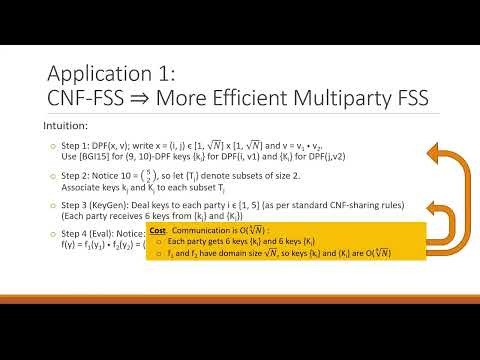CryptoDB
CNF-FSS and its Applications
| Authors: |
|
|---|---|
| Download: | |
| Presentation: | Slides |
| Conference: | PKC 2022 |
| Abstract: | Function Secret Sharing (FSS), introduced by Boyle, Gilboa and Ishai~\cite{BGI15}, extends the classical notion of secret-sharing a \textit{value} to secret sharing a \textit{function}. Namely, for a secret function $f$ (from a class $\cal F$), FSS provides a sharing of $f$ whereby {\em succinct} shares (``keys'') are distributed to a set of parties, so that later the parties can non-interactively compute an additive sharing of $f(x)$, for any input $x$ in the domain of $f$.
Previous work on FSS concentrated mostly on the two-party case, where highly efficient schemes are obtained for some simple, yet extremely useful, classes $\cal F$ (in particular, FSS for the class of point functions, a task referred to as DPF~--~Distributed Point Functions~\cite{GI14,BGI15}).
In this paper, we concentrate on the multi-party case, with $p\ge 3$ parties and $t$-security ($1\le t |
Video from PKC 2022
BibTeX
@inproceedings{pkc-2022-31721,
title={CNF-FSS and its Applications},
publisher={Springer-Verlag},
author={Paul Bunn and Eyal Kushilevitz and Rafail Ostrovsky},
year=2022
}

